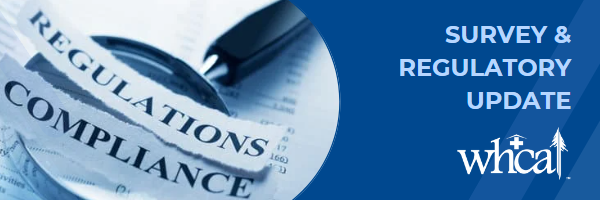Jan 3 2023 | Pets in Assisted Living
Pets can be a benefit to residents in assisted living; dogs and cats (and other animals) offer companionship and attention and can enhance the homelike feel of an assisted living community. Regardless of who owns the pet, there are regulatory expectations to follow.
WAC 388-78A-2620 states that if the assisted living facility allows pets to live on the premises, the assisted living must do the following:
- Develop, implement, and disclose to potential and current residents, policies regarding:
- The types of pets that are permitted in the facility and the conditions under which pets may be in the assisted living. This might include limits on the size of the animal, type of animal(s) allowed, and/or the number of pets a resident may have at one time.
- The conditions under which pets may be in the assisted living facility. This might include expectations of the pet owner; for example, the resident must be able to clean up after the animal, ensure the animal is on a leash when outside of the resident’s apartment, etc.
- Ensure animals living on the premises have regular examinations and all recommended immunizations appropriate for the species. These exams and immunizations must be provided by a veterinarian licensed in Washington State. The veterinarian must certify that the animal is free from diseases that are transmissible to humans.
- Ensure animals are not allowed in central food preparation areas.
Some additional considerations when an assisted living allows pets include:
DEPOSITS. Part of a pet agreement likely includes any pet deposits. These cannot be imposed on residents whose payment source is Medicaid.
HOSPITALIZATIONS. There should be plans in place for ongoing pet care in the event the resident pet owner experiences a hospitalization or prolonged rehabilitation. Likewise, the resident/family should have plans in place should the pet require emergency care.
DISASTERS/EMERGENCIES. Pet care should be included in each facility’s disaster/ emergency plan. Provisions for ongoing food and water, along with other necessary items, must be considered. Evacuation plans should include pet management efforts.
Of note, service animals and emotional support animals are not considered pets but rather are considered health care options and must be allowed under the Fair Housing Act as a reasonable accommodation. Deposits, size limitations, and other aspects of a facility’s pet policy do not apply for service animals. It is recommended that facilities have a service animal policy, separate from a pet policy. For more details on service animals, refer to this document and consider speaking with an attorney should additional questions arise.
If you have questions about assisted living regulations, please contact Vicki McNealley via email or call 1-800-562-6170 extension 107.

